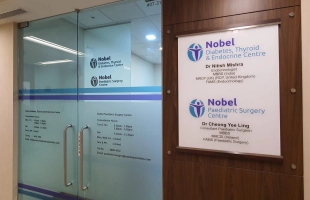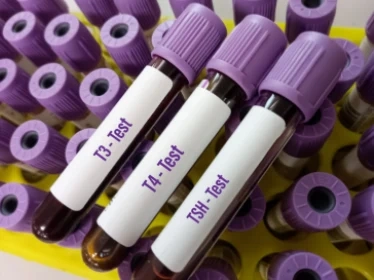
For many mothers, this diagnosis comes with a flood of emotions, and just as many questions.
It’s not the news any mother wants to hear.
You may have been feeling fine. Maybe it came as a surprise during a routine check-up. And now, you’ve been told your blood sugar levels are higher than they should be and that you have gestational diabetes, also known as GDM.
If you’re feeling unsure or overwhelmed, you’re not alone. But here’s the good news: with the right support, gestational diabetes can be managed safely. And more importantly, it can be managed well, for both you and your baby.
The key lies in understanding what happens next. And why the right kind of care makes a world of difference.
GDM Isn’t Your Fault, But Managing It Is Essential
Gestational diabetes is a type of diabetes that develops during pregnancy. Like other forms of diabetes, it affects how your body regulates blood sugar and can have a broader impact on your overall health.
It happens when hormones produced during pregnancy interfere with how your body uses insulin. This is called insulin resistance, and when your body can’t make enough insulin to keep blood sugar in check, levels begin to rise.
Some factors that may increase the risk of gestational diabetes include how far along you are in your pregnancy, being over the age of 30, having a family history of diabetes, a history of gestational diabetes or polycystic ovarian syndrome.
This does not mean you have failed, and it does not mean your baby is in immediate danger. But it does mean your body is asking for support. Acting early can help protect both you and your child.
Why Blood Sugar Levels Matter, Even If You Feel Fine
Many women with gestational diabetes feel completely well. In fact, there may be no obvious signs or symptoms of gestational diabetes at all.
But rising blood sugar levels can quietly increase the risk of:
- Pregnancy complications, such as pre-eclampsia or early delivery
- Excessive baby growth (macrosomia), making delivery riskier
- Low blood sugar in the baby after birth
- A higher chance of developing Type 2 diabetes later in life
That’s why gestational diabetes often requires careful follow-up, even when you feel completely well.
Your Obstetrician Diagnosed It, Now What?
For many women, gestational diabetes is first detected during a routine glucose screening with their obstetrician (OB). From there, care continues with your OB for pregnancy monitoring and delivery planning.
But when it comes to managing your blood sugar, including what to eat, how to track your glucose, and whether you will need insulin, that is where a specialist steps in.
Endocrinologists are trained to understand how your body responds to hormonal changes during pregnancy, and they work with you to keep your blood sugar levels within a safe range.
Managing Gestational Diabetes with an Endocrinologist

Having an endocrinologist on your team means more than just getting another doctor involved. It means having a specialist who understands how your hormones are changing and how those changes affect your body’s ability to manage sugar. Here’s what that support may look like during your pregnancy:
1. They Set Safe, Personalised Targets
Not all pregnancies are the same. Your endocrinologist will set glucose targets tailored to your body, health history, and pregnancy stage.
2. They Work with You on Practical Lifestyle Changes
They help you understand how food, movement, and rest affect your blood sugar levels, and create a plan that works with your lifestyle.
3. They Decide When Medication Is Needed
When lifestyle changes aren’t enough, endocrinologists prescribe insulin resistance treatment, either a tablet which may work for some patients or insulin injections which are effective for everyone. Insulin is safe to use during pregnancy when properly managed.
4. They Monitor and Adjust Along the Way
Pregnancy changes rapidly. Your endocrinologist will guide you through regular reviews, making changes when needed to keep things on track.
5. They Coordinate with Your Obstetrician
If your baby is growing quickly or complications arise, your endocrinologist works closely with your OB to time delivery safely and reduce birth risks.
What You Can Do Now: Tips for Managing GDM
If you’ve recently been diagnosed with gestational diabetes, here are some steps you can begin taking today, even before your specialist appointment:
Track Your Blood Sugar Levels
If you've been given a glucometer, check your glucose as instructed. It is usually tested before meals and one to two hours after eating. Log your readings to spot patterns.
Common target ranges:
- Before meals: 4.0 to 5.3 mmol/L
- 1 hour after meal: under 7.8 mmol/L, or
- 2 hours after meal: under 6.7 mmol/L (Your endocrinologist will confirm your specific targets.)
Be Smart About Carbs
Not all carbs are the same. Choose:
- Whole grains like brown rice, oats, and wholemeal bread.
- Low-GI fruits like apples, pears, and berries.
- Legumes such as lentils or chickpeas.
- Avoid sweet drinks, white rice, sugary snacks, and deep-fried foods.
Eat Smaller, Balanced Meals
Divide your intake into 3 main meals and 2 to 3 light snacks. This helps stabilise blood sugar levels and prevents large spikes.
Move Gently After Meals
A short walk after eating helps your body process glucose more efficiently. This small habit can have a big impact.
Ask These at Your Next Check-Up
If you're not sure what to ask during your next appointment, these questions can help guide the conversation and give you a clearer sense of what to expect:
- What are my personal glucose targets?
- Will I need insulin?
- What signs should I look out for?
- What happens after I give birth?
Why Management Doesn’t End After Birth
Most women see their gestational diabetes resolve after delivery. But that doesn’t mean the work is over.
If you’ve had GDM once, you’re more likely to develop Type 2 diabetes later in life. Your child may also face a higher risk of obesity or glucose intolerance down the road.
That’s why postnatal follow-up with an endocrinologist is essential. They’ll help you:
- Monitor your health after pregnancy
- Plan regular diabetes screening
- Make long-term changes that support your health and your child’s wellbeing
Get Support That’s Personalised and Close to Home
Managing pregnancy diabetes isn’t just about getting through the next few weeks. It’s about protecting your health and your baby’s, both now and in the future.
If you need help managing gestational diabetes or would like to speak with a specialist, guidance is available every step of the way. At Nobel Diabetes, Thyroid and Endocrine Centre, our endocrinologist supports mothers with gestational diabetes through personalised, medically guided care during pregnancy and beyond.








